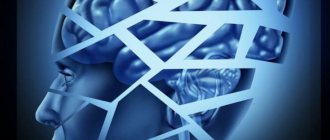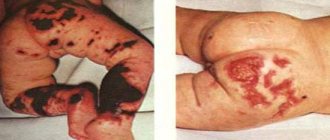- Dementia in adults
The medical term for dementia is dementia resulting from organic damage and improper functioning of the brain. It occurs as an independent disease, or as a secondary side symptom of another illness. Making a diagnosis requires several procedures and examination of the active brain.
Symptoms and signs of dementia
It is important to note that the manifestation of certain symptoms presupposes a preliminary determination of the cause of dementia, as well as where the brain damage is localized. It is customary to distinguish several stages of dementia, depending on the developing symptoms.
Symptoms of senile dementia
Symptoms of mental retardation can vary. The determining factor is the initial diagnosed disease, which serves as an impetus for the onset of dementia. Often at the initial stage the following symptoms can be identified:
- Decreased physical activity
- Lack of previous interests
- Development and appearance of apathy
- Formation of persistent dependence on close relatives.
As intellectual activity begins to decline, a person loses the ability to care for himself independently. Living alone in your own space becomes impossible and life-threatening. A person begins to forget whether he used electrical appliances or whether the gas was turned on. Therefore, constant monitoring by other people or representatives of social protection will be required.
Signs of senile dementia
The development of intellectual or thinking dementia is slow and gradual. Often, the disease is diagnosed at a later stage, since the first stage can be latent. The hallmark signs of dementia include impairments in the following areas:
- Decreased memory functioning
- Mental abilities deteriorate
- Manifestation of negative emotional background
- Physical capabilities become limited
- Behavioral changes and impaired communication skills
- The perception of the world and surrounding events is distorted.
The increase in the manifestation of the corresponding symptoms occurs slowly, and the rate of degradation also depends on negative external factors.
Forms of oligophrenia
In total, there are three forms of oligophrenia:
- First. Caused by hereditary factors. These include diseases such as Crouzon syndrome, Marfan syndrome, true microcephaly and others.
- Second. It is characterized by the fact that the development of oligophrenia is caused by damage to the fetus inside the womb. This is usually caused by various viral infections, toxoplasmosis, congenital syphilis, hormonal disorders or listeriosis.
- Third. Usually occurs during fetal development when exposed to factors such as Rh factor conflict. The afterbirth period is affected by birth trauma or asphyxia. And the transmission of infections, traumatic brain injuries, congenital hydrocephalus, as well as poor development of brain systems.
There are also true and false forms of oligophrenia, which do not belong to any of the above.
Symptoms of dementia in adults
The first symptom that may indicate the onset of dementia is impaired intellectual activity and pathological memory loss. At the onset of the disease, the functioning of short-term memory deteriorates. For example, the patient cannot remember where he put the thing or object.
The second aspect is deterioration in thinking. Over time, building a logical chain becomes an impossible task. It is impossible to plan a plan even for a short period of time, to determine for yourself a solution to problems that require a quick solution.
Concentration also suffers, since the patient cannot control several objects at the same time. It becomes difficult to quickly respond and switch from one object to another.
Higher functions operate in a pathological mode:
- Aphasia. The patient cannot find the right words or phrases to express his own opinion
- Apraxia. Inability to purposefully perform certain actions. Skills that have been performed for years can no longer be fully reproduced
- Agnosia. Inability to really perceive current events.
Also, during the development of dementia, orientation in space is disrupted. Depending on the development of the pathology, often the patient cannot remember where his home is.
Features of admission to the clinic
It is most convenient to make a preliminary call to our center. Phone number 8(969)060-93-93 . It is not difficult to call it, since it is multi-channel and works in hotline mode. Dispatchers answer calls around the clock. Call us even on holidays and weekends. Any type of consultation, both telephone and at a doctor’s appointment, diagnosis and treatment are carried out anonymously. Respecting confidentiality, we do not provide any information about our clients. Information can only be received by the person who was declared when the patient was registered for treatment.
The receptionist will make an appointment for you to see a psychiatrist. During the conversation and examination, the doctor will make his suggestions. If you need hospitalization, you can choose the most suitable class of room, differing in the degree of comfort and price.
We have the following room options:
- Standard (for 4, 3 and 2 people).
- Double comfort.
- Single VIP.
In addition to diagnostic and therapeutic procedures, we provide patients with high-quality nutrition and, if necessary, provide an individual nursing station.
Dementia treatment
It is important to take into account that the full extent of senile dementia is incurable. However, with the correct selection of drug treatment and psychotherapy, it is possible to slow down the process of brain damage. Some patients, due to self-criticism, begin to hide their disease from prying eyes and doctors, which only complicates the treatment process.
The use of medications is necessary if the patient is diagnosed with sleep problems, the development of a depressive state, or the occurrence of hallucinations. Stimulants, vitamin complexes and neurometabolic stimulants help improve blood circulation in the brain.
Tranquilizers help cope with increased anxiety, and antidepressants help with the development of depression over a long period of time.
In combination with drug therapy, the patient must interact with a psychotherapist who develops an individual interaction program using proven techniques. If dementia is in its early stages, it is recommended to interact with other people as often as possible.
Classification
Doctors at our center adhere to the international division of the disease into two main types. Identification is important in subsequent treatment of the disease.
Forms of violation:
- Agitated. It manifests itself as pronounced excitement, emotional swings from euphoria to phobias.
- Depressed. She is characterized by an anxious, depressed and melancholy mood, and isolation.
Diagnosis of dementia
Diagnostic measures are aimed at identifying specific aspects and signs characteristic of the manifestation of dementia. During the conversation, the specialist identifies memory problems. If there is a suspicion of the development of dementia, measures are taken to establish apraxia, agnosia and aphasia.
Dementia in adults
In the process of developing dementia, nerve cells in the brain begin to die, which often occurs due to disturbances in metabolic processes, the development of oncology, or problems with blood vessels. Among the main diagnostic methods, the following can be distinguished:
- Psychiatric examination, medical history, complaints
- Visiting a neurologist and conducting a thorough examination
- Passing psychological tests that identify pathological functioning of memory, thinking, and concentration
- Testing for the biochemical composition of blood
- MRI, CT, EEG, neurotest.
The development of dementia affects all types of brain activity: the emotional sphere, abstract thinking, memory and attention. Often an adult becomes capricious and infantile, like a child.
Dementia in children
The clinical picture is determined based on age-related diagnosis. A school-age child may experience cerebral lesions. There is a contrast between the level of development of skills, erudition, and cognitive activity. The child can develop a sufficient vocabulary; it fully describes each experiencing event.
The possibility of abstract thinking is completely or partially absent. A child is unable to understand a joke or explain the meaning of a proverb; it is impossible to transfer life experience to a specific situation.
Regarding younger children, their symptoms are different. The main criterion is psychomotor arousal. There is no emotional stability: the child does not feel longing for his parents, a connection with his mother is not formed, and there is no instinct of self-preservation.
Mental dementia
Mental dementia is a pathological form characterized by deterioration of intellectual activity. As a result, a person does not have the opportunity to build connections between the real world around him and his own imagination. In addition to impaired cognitive function, emotional poverty is observed. Over time, a person’s vocabulary begins to gradually become poorer.
It may be an acquired or congenital pathology. The cause of the development of mental dementia can be any organic damage to the brain. Elderly people are at risk, but every year the number of young people suffering from this disease continues to increase.
Dementia in the elderly
As we age, brain activity begins to slow down, resulting in dementia in old age. A person is unable to remember a large amount of information and is unable to navigate the area. As it progresses, he loses the ability to care for himself independently. Since the memory function is greatly weakened, there is danger and threat to the patient's life.
The degradation of mental potential occurs gradually and can be associated with many reasons: mechanical damage, hereditary aspects and the result of aging.
May appear as a side effect of diseases such as Alzheimer's, Pick's or Parkinson's.
Dementia - dementia
Dementia and dementia have many similarities. First of all, these can be congenital or acquired pathologies caused by third-party diseases, hereditary factors, or organic brain damage. A distinctive feature is a decrease in the ability for intellectual activity, thinking, concentration and the ability to fully explain one’s own thoughts.
As it progresses, the patient experiences emotional impoverishment. A person is unable to rejoice or show negative emotions. It is worth noting that the patient in adulthood begins to show signs of childish behavior (becomes capricious, demands attention to his person).
Chronic dementia
Throughout the entire period of research, experts have not been able to find a medicine that will fully cure dementia. Accordingly, as it accumulates, the disease becomes chronic. To prevent dementia from progressing further at a rapid rate, it is only possible to prescribe supportive procedures that will help slow down the decline in intellectual activity.
Alcoholic dementia
With constant consumption of alcoholic beverages in large dosages, ethyl alcohol accumulates in the body, which negatively affects the functioning of neurotransmitters. They are responsible for the work of the emotional component. As alcoholism develops, a person experiences impaired functioning of memory, emotional manifestations, and inability to concentrate. A distinctive characteristic from other manifestations is a persistent disruption of the functioning of neurons under the influence of ethyl alcohol.
Temporary dementia
Temporary dementia often occurs as a result of metabolic disorders, Alzheimer's disease, or a negative reaction to drug treatment. It is important to note that if a person is diagnosed with HIV or AIDS, temporary dementia may occur as a side symptom over time. The signs are the same as with the development of classic dementia.
Dementia in women
Dementia occurs in women for many reasons. In addition to the main diseases (Alzheimer's, Pick's disease), it is worth paying attention to the period of hormonal changes during menopause. The primary manifestations of dementia are a depressive state and decreased emotional response.
As it develops, a person’s intellectual activity slows down, thinking is impaired, there is a lack of attention and the ability to navigate the terrain.
Mental dementia
The main cause of mental dementia is impaired brain function. This may be mechanical damage, metabolic disorders. First of all, short-term memory suffers, the inability to concentrate one’s attention on more than one object. As it progresses, a person is unable to fully express himself because he forgets once well-known words.
Reasons for development
Age-related changes in the structure of the brain are considered the main cause of dementia. But if previously acquired dementia was considered a characteristic pathology of old age, now it is diagnosed at a younger age. Cases of dementia diagnosis in people under 35 years of age have become more frequent.
Dementia is caused by diseases that lead to degenerative processes and destruction of cellular structures of the brain. This is, in particular, Alzheimer's syndrome, which leads to the death of neurons. As a result, the volume of the brain decreases.
Sometimes the triggering factors are hereditary diseases. For example, it could be Huntington's disease, which causes loss of coordination and mental disorders. In this case, the pathology can be diagnosed in childhood, but its first pronounced symptoms appear at 30-35 years of age. A provoking factor in the development of dementia can be drug, drug or alcohol intoxication.
Dementia can occur at any age as a complication against the background of other pathologies:
- Atherosclerosis of cervical and cerebral vessels.
- Vascular lesions during the development of infectious diseases: meningitis, encephalitis, etc.
- Strokes.
- Arterial hypertension in severe form.
- Diabetes mellitus.
- Head injuries.
- Tumors.











